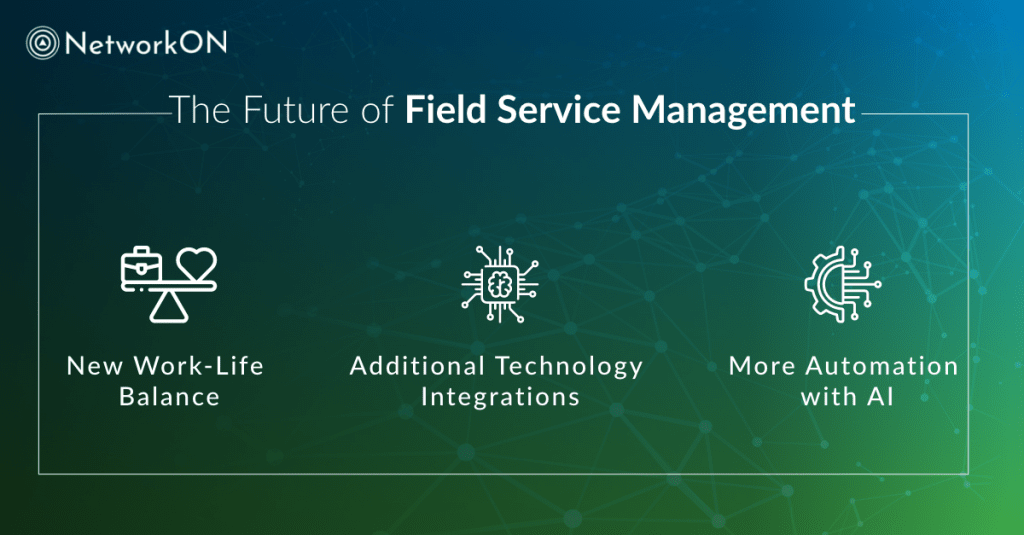Table of Contents
The COVID-19 pandemic was a hard reset for many industries and brought a significant paradigm shift to the way businesses operated. Field service management is no exception and has moved towards contactless service and self-service models in the past two years.
As these trends evolve, we can expect to see a more refined version of artificial intelligence (AI) affecting different aspects of a business. As a result, companies will move towards automating every process and rely on cloud technology more than they ever have in the past.
The Big Impact
The pandemic forced companies to deal with more and more customers using online services. However, this transformation also changed the dynamics of a delighted customer experience and changed customer expectations drastically.
Field service agents are no longer a team of qualified technicians alone. Instead, they now have an added responsibility of providing services while keeping all the safety precautions in mind to meet customer demands.
As new safety protocols are set in place by local government authorities, it remains challenging for businesses to interact with the field service staff and ensure that they follow all the required safety measures when operating in the field.
So, suppose you own a business that deals with customer service daily. In that case, it is essential that you optimize the functioning of your field service teams and maintain seamless communication between the customers and staff members at all times.
Also, optimizing how you procure service jobs using channels like a mobile app, online appointment booking, and chat. The transition from a traditional process to a digital one also requires you to manage your last-mile operations effectively and diligently monitor all staff members.
In this post, we will look at the changes in customer expectations and highlight the trends you need to align with your business. Several areas continue to be affected as more businesses get ready for contactless service opportunities by implementing field service management technologies in their process.
Let’s take a look at some of the most important trends you need to consider for efficient field service management:
Make Everything Contactless
Ever since the onset of the pandemic, customers have become more aware and refuse to return to the service standards of the past. Therefore, in many places, businesses must adhere to safety protocols like contactless service to ensure the safety of field staff and customers.
Organizations must find ways to automate every aspect of their field service business to achieve the status of everything contactless. Some of the measures include:
Allow the field staff to receive service appointments on their smartphones and limit the visits to the office to mitigate contact risks.
Enable auto-dispatch of jobs from a central dashboard and provide them with the fastest route to reduce the time spent in transit.
Incorporate the option to work from home for field staff dealing with IT-related technical issues by remotely providing access to a customer’s device.
You can connect your existing CRMs with field service management software to monitor these contactless interactions and use the data to assess future needs.
Encourage Self-Service
How cool would it be to help the customers resolve their issues without waiting hours for a technician? However, it is easier said than done. A self-service portal can connect you with your customers and capture the details about the problem they are experiencing.
If you cannot help the customer then and there, you can send the captured data to the field service agents, who can visit the location with all the things needed to resolve the issue during the first visit.
In addition to convenience, these portals can update the field staff in real-time of any changes with the job and efficiently manage the service standards with seamless communication between all stakeholders.
Incorporate Multiple Payment Methods
The pandemic has also established that cash can act as a transmitter of the virus, and it has pushed the customers towards using alternative payment methods.
Surprisingly, even B2B transactions are no longer cash-oriented, and stakeholders prefer to use digital payments wherever possible.
Since customers prefer digital payments, it is good to incorporate as many payment methods as possible into your field service business. However, if you resist investing in contactless card readers or mobile payments, you will likely lose some of your business and experience reduced revenues in the long run.
Rise of IoT and Artificial Intelligence
Multiple industries like healthcare, manufacturing, automobile, and more are investing heavily in AI and IoT to improve their field service management capabilities.
While AI can match the technicians with upcoming jobs and provide optimized routes based on geographical data, IoT sensors can help the field staff provide better customer support remotely.
The Future of Field Service Management
Taking care of your staff members to perform well consistently is essential. Yes, they are better off with automated tools by their side, but it is also important to look for their best interests in the process.
The path field service management will likely follow by incorporating all the abovementioned factors.

New Work-Life Balance
Your customers probably feel the need for it, and so do your field service agents. The COVID-19 pandemic has shifted the employees’ attitudes towards work, and they are searching for a new work-life balance.
The perfect answer to this issue is allowing your field staff to follow a hybrid working style. They can have a positive work-life balance if they have the option to resolve as many issues as possible working remotely.
When you trust your employees, they find ways to work more efficiently and leverage all the technology at their disposal to acquire higher success rates in the jobs assigned to them.
Additional Technology Integrations
Empathy may not sound like a big deal, but it has differentiated the champs from the chumps. Many field service agents lost their jobs during the pandemic as they were not allowed to work from any place other than their offices.
While the chumps chose to fire or furlough much staff, champs immediately integrated new technologies into their business to back up their field service teams. Remote working processes integrated seamlessly with the existing workflow and allowed the staff members to keep working their jobs from the safety of their homes.
Therefore, field service management software is not just a contingency plan, but it can also be used as a way to scale up your service operations and reach out to a broader customer base remotely.
More Automation with AI
It is no secret that the supply chains were strained and even choked for some industries in the past two years. The field service industry constantly needs a skilled workforce, and to meet the demand, many companies opted for automation.
AI-based automation platforms allow companies to connect with more field service agents remotely and use complex algorithms to schedule jobs based on their expertise and skill set. This approach reduces the time needed to manually assess every field service agent and allows you to boost your bottom line.
Moreover, AI curates data every step of the way and uses the information to develop more proactive ways an organization can deal with service-related issues in the future.
Wrapping Up
Investing in field service management software doesn’t need to burn a big hole in your pockets. You can start free with NetworkON and experience the positive impact on your business from the first day of using it.
Leverage NetworkON’s route optimization, geofencing, and real-time tracking capabilities for your field staff management.
You can take a look at NetworkON’s comprehensive list of features here. To know more about getting started with a field service management software, email us at info@networkon.io or visit our website.
Frequently Asked Questions:
Q1: How has the COVID-19 pandemic impacted the field service management industry?
The COVID-19 pandemic has triggered a paradigm shift in the field service management industry, focusing on contactless service and self-service models. This FAQ explores the industry’s response and the resultant trends.
Q2: What are the key challenges businesses face in interacting with field service staff amid new safety protocols?
As local government authorities implement new safety protocols, businesses find it challenging to interact with field service staff and ensure compliance. This FAQ delves into the difficulties faced and the need for seamless communication.
Q3: How can businesses transition from traditional processes to a digital model for field service management?
This FAQ discusses the essential steps for businesses to optimize their field service teams, procure service jobs efficiently through channels like mobile apps, and monitor staff members diligently during the transition to a digital field service management process.
Q4: Why is contactless service crucial, and how can organizations achieve an entirely contactless field service model?
Exploring the significance of contactless service post-pandemic, this FAQ provides insights into measures organizations can take to automate every aspect of their field service business, ensuring safety for field staff and customers.
Q5: How can a self-service portal enhance field service management and communication?
This FAQ highlights the benefits of implementing a self-service portal for customers, enabling them to resolve issues independently. It also discusses the real-time communication between customers and field staff, improving service standards.
Q6: What role do IoT and Artificial Intelligence play in the future of field service management?
This FAQ delves into the increasing role of IoT and AI in various industries, including field service management. It explores how AI can optimize technician scheduling and how IoT sensors can enhance remote customer support, contributing to the industry’s future.





0 Conversations